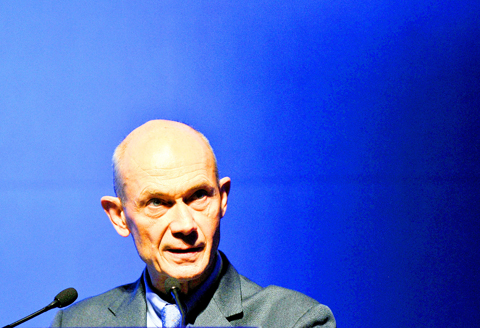The Obama administration plans to cut its estimate of the projected costs of the government bailout program by more than US$200 billion, a US Treasury official said on Sunday.
The official said the administration now believes the cost of the program would be at least US$200 billion below the US$341 billion estimate it made in August.
The official, who spoke on condition of anonymity because the new projection has not been presented to Congress, said the reduced cost estimate reflected faster repayments by big banks and less spending on some of the programs.

PHOTO: AFP
The administration’s estimate that the US$700 billion financial rescue program will cost at most US$141 billion is down sharply from the estimate of US$341 billion made in the administration’s mid-session budget review in August.
The official said the new estimate will become part of the administration’s new budget, which US President Barack Obama will present to Congress in February.
The US$700 billion financial rescue program, known as the Troubled Asset Relief Program (TARP), was passed by Congress in October last year at the height of the worst financial crisis to hit the country since the 1930s.
Obama is scheduled to give a speech on the economy today and it is possible that he will raise the idea of using repaid TARP funds for increased efforts to help the unemployed.
Republicans have voiced opposition to this approach, arguing that the money should be used to lower the government’s ballooning deficits.
US Treasury Secretary Timothy Geithner has told Congress he hopes to end the bailout program as soon as possible.
He has indicated a preference for using a portion of the TARP resources to pay down the national debt, which is being pushed higher by record deficits.
Lowering the estimated cost of TARP will also lower the administration’s projections for budget deficits. The deficit for the 2009 budget year, which ended in September, hit a record US$1.42 trillion and the administration in August projected a slightly higher deficit for the current year.
Banks have already repaid about US$70 billion in support they have received from the bailout fund, and Bank of America recently announced it was returning the US$45 billion in government support it had received.

People can preregister to receive their NT$10,000 (US$325) cash distributed from the central government on Nov. 5 after President William Lai (賴清德) yesterday signed the Special Budget for Strengthening Economic, Social and National Security Resilience, the Executive Yuan told a news conference last night. The special budget, passed by the Legislative Yuan on Friday last week with a cash handout budget of NT$236 billion, was officially submitted to the Executive Yuan and the Presidential Office yesterday afternoon. People can register through the official Web site at https://10000.gov.tw to have the funds deposited into their bank accounts, withdraw the funds at automated teller

PEACE AND STABILITY: Maintaining the cross-strait ‘status quo’ has long been the government’s position, the Ministry of Foreign Affairs said Taiwan is committed to maintaining the cross-strait “status quo” and seeks no escalation of tensions, the Ministry of Foreign Affairs (MOFA) said yesterday, rebutting a Time magazine opinion piece that described President William Lai (賴清德) as a “reckless leader.” The article, titled “The US Must Beware of Taiwan’s Reckless Leader,” was written by Lyle Goldstein, director of the Asia Program at the Washington-based Defense Priorities think tank. Goldstein wrote that Taiwan is “the world’s most dangerous flashpoint” amid ongoing conflicts in the Middle East and Russia’s invasion of Ukraine. He said that the situation in the Taiwan Strait has become less stable

CONCESSION: A Shin Kong official said that the firm was ‘willing to contribute’ to the nation, as the move would enable Nvidia Crop to build its headquarters in Taiwan Shin Kong Life Insurance Co (新光人壽) yesterday said it would relinquish land-use rights, or known as surface rights, for two plots in Taipei’s Beitou District (北投), paving the way for Nvidia Corp to expand its office footprint in Taiwan. The insurer said it made the decision “in the interest of the nation’s greater good” and would not seek compensation from taxpayers for potential future losses, calling the move a gesture to resolve a months-long impasse among the insurer, the Taipei City Government and the US chip giant. “The decision was made on the condition that the Taipei City Government reimburses the related

FRESH LOOK: A committee would gather expert and public input on the themes and visual motifs that would appear on the notes, the central bank governor said The central bank has launched a comprehensive redesign of New Taiwan dollar banknotes to enhance anti-counterfeiting measures, improve accessibility and align the bills with global sustainability standards, Governor Yang Chin-long (楊金龍) told a meeting of the legislature’s Finance Committee yesterday. The overhaul would affect all five denominations — NT$100, NT$200, NT$500, NT$1,000 and NT$2,000 notes — but not coins, Yang said. It would be the first major update to the banknotes in 24 years, as the current series, introduced in 2001, has remained in circulation amid rapid advances in printing technology and security standards. “Updating the notes is essential to safeguard the integrity